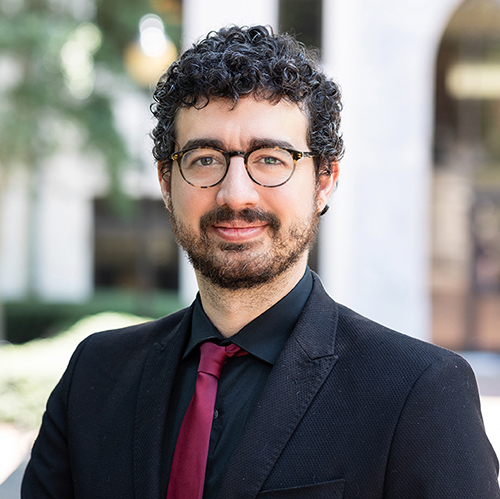Leonardo Velloso-LyonsAssistant Professor of Spanish and Portuguese
Biography
Leonardo Velloso-Lyons is a scholar of early modern literatures, working primarily on sources in Spanish and Portuguese, and comparatively with Latin, Quechua, and Italian. He received his Ph.D. in Comparative Literature from Stanford University with a focus on literatures and cultures from the early modern Ibero-Atlantic world. Broadly speaking, his research examines the uses of the past in early modern discourses; more specifically, the relation between literary, historical, and geographic discourses, the writing of global and local histories, the interaction between cartographic objects, rhetoric, and literature. A trained historian and literary scholar, Leonardo’s research interests include theoretical and comparative approaches to early modernity from the fields of Transatlantic and Transoceanic studies. He has been a fellow at the Stanford Humanities Center (2020-21), a Mabelle McLeod Lewis Fellow (2021-22), at the John Carter Brown Library (short-term), and at Cornell’s Society for the Humanities (2022-23). A proud interdisciplinary scholar from Brazil, Leonardo holds a B.A. and an M.A. in History from the Federal University of Espirito Santo, Vitoria, Brazil, his alma mater, where he studied from 2007 to 2013.
Leonardo is currently working on his first book, provisionally entitled Reflecting Africa: Rhetoric, History and the Hinterlands in the Early Modern Ibero-Atlantic, which shows how early modern historians theorized Africa for their readers through three figures of thought, in doing so, constructing racialized geographic identities that could rationalize European colonial projects around the globe. Written in Viceregal Peru, Senegambia, New Granada, and the Iberian Peninsula, such works illustrate how writers in different parts of the Ibero-Atlantic grappled with the same inherent epistemological tension when looking at the empires’ hinterlands: they promise insights into an increasingly interconnected world yet can only offer them by means of frequent comparisons with other sites that implicitly or explicitly reveal their own vantage point. By using methods from literary studies, history, and intellectual history, Leonardo shows how historians developed an idiosyncratic system of mirrors, in which a figural image of Africans and Africa served to elucidate aspects of other peoples and territories in the Spanish and Portuguese empires. In Reflecting Africa, Leonardo argues that the work of historians who sought to curb what they perceived as an undesirable African influence on the Spanish and Portuguese imperial project is also an archive that demonstrates how mutually influential these emergent racialized geographic identities were. Reflecting Africa invites scholars to consider how the concept of hinterlands—the contested zones that appear in early modern Ibero-Atlantic historiography—helps reveal the process whereby historians attempted to domesticate real uncertainties about unfamiliar regions by collapsing the enormous geographic, ethnic, and cultural diversity of the African into a single identity, to then subsequently flatten other identities as well.
